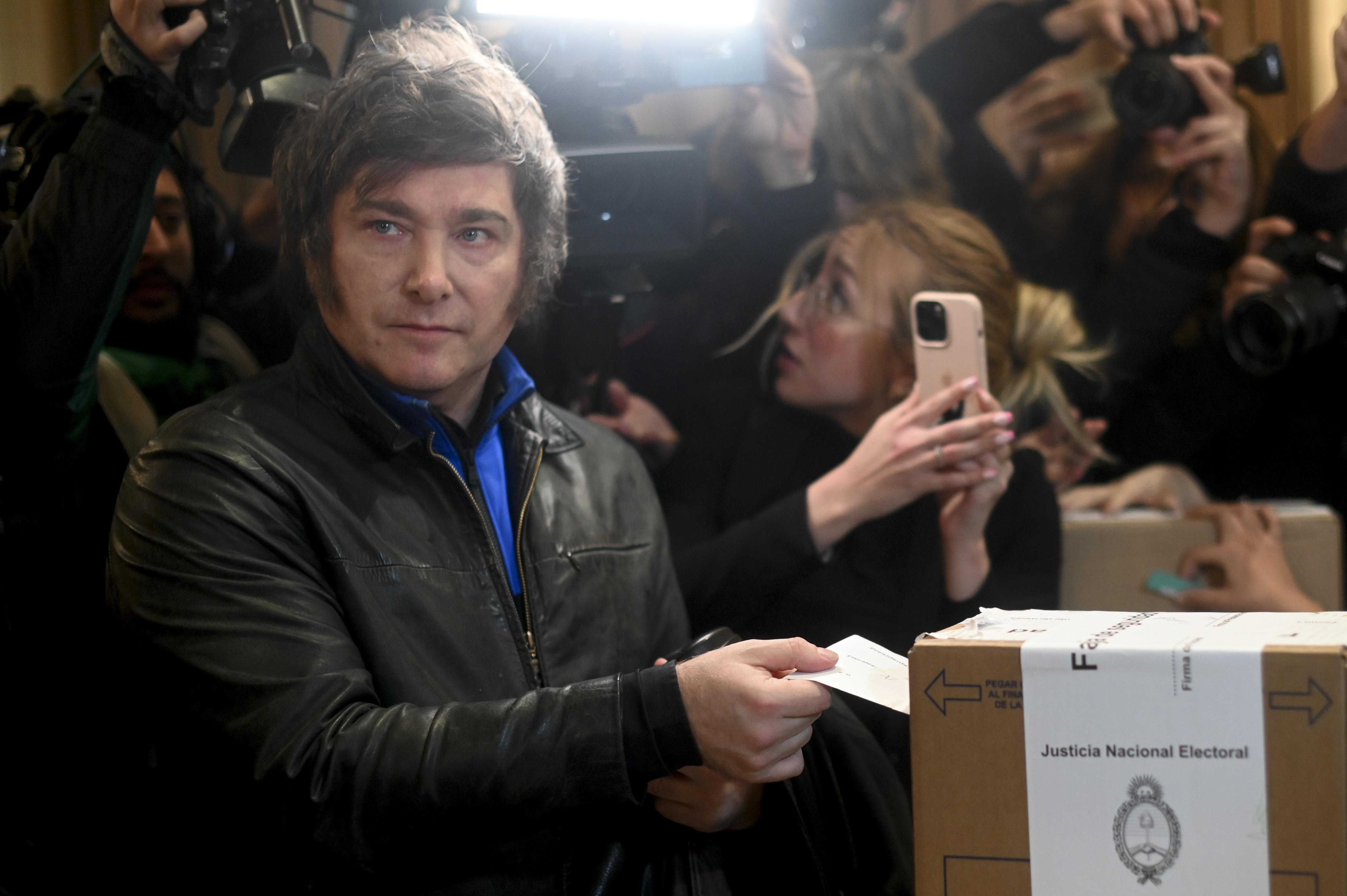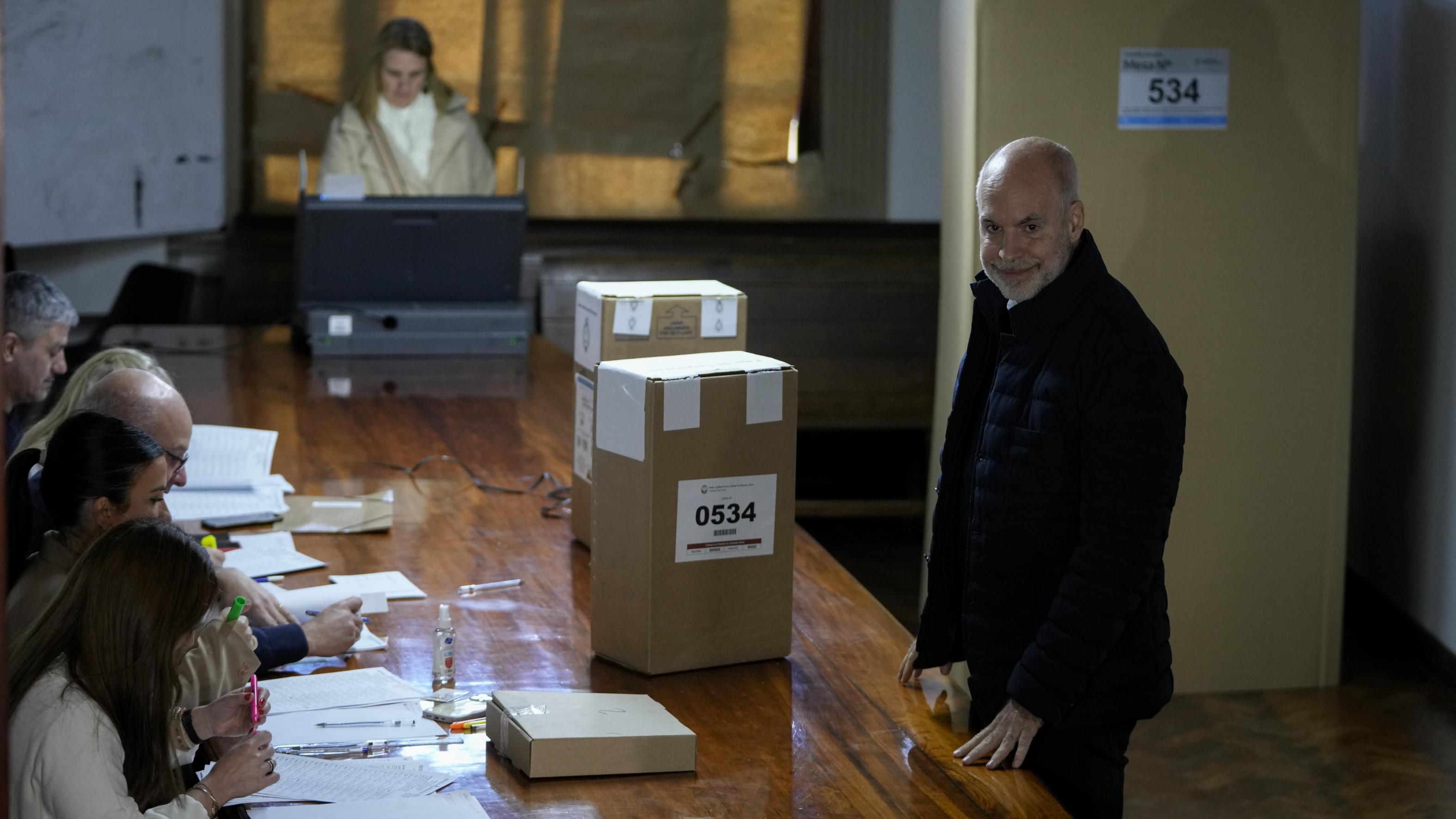 Javier Milei, presidential hopeful of the Liberty Advances coalition, votes during primary elections in Buenos Aires, Argentina, Aug 13, 2023. (PHOTO / AP)
Javier Milei, presidential hopeful of the Liberty Advances coalition, votes during primary elections in Buenos Aires, Argentina, Aug 13, 2023. (PHOTO / AP)
BUENOS AIRES - Argentine voters punished the country's two main political forces in a primary election on Sunday, pushing a rock-singing libertarian outsider candidate into first place in a huge shake-up in the race towards presidential elections in October.
With some 90 percent of ballots counted, far-right libertarian economist Javier Milei had 30.5 percent of the vote, far higher than predicted, with the main conservative opposition bloc behind on 28 percent and the ruling Peronist coalition in third place on 27 percent.
The result is a stinging rebuke to the center-left Peronist coalition and the main Together for Change conservative opposition bloc with inflation at 116 percent and a cost-of-living crisis leaving four in 10 people in poverty.
Voting in the primaries is obligatory for most adults and each person gets one vote, making it in effect a dress rehearsal for the Oct 22 general election and giving a clear indication of who is the favorite to win the presidency
"We are the true opposition," Milei said in a bullish speech after the results. "A different Argentina is impossible with the same old things that have always failed."
Voting in the primaries is obligatory for most adults and each person gets one vote, making it in effect a dress rehearsal for the Oct 22 general election and giving a clear indication of who is the favorite to win the presidency.
The October election will be key for policy affecting Argentina's huge farm sector, one of the world's top exporters of soy, corn and beef, the peso currency and bonds, and ongoing talks over a $44 billion debt deal with the International Monetary Fund.
READ MORE: Argentines head to polls in primary elections
The economic crisis has left many Argentines disillusioned with the main political parties and opened the door for Milei, who struck a chord especially with the young.
"Inflation is killing us and job uncertainty doesn't let you plan your life," said Adriana Alonso, a 42-year-old housewife.
As polls closed in the early evening after voting system glitches caused long lines in capital Buenos Aires, all the talk in campaign hubs was about Milei, a brash outsider who has pledged to shutter the central bank and dollarize the economy.
"Milei's growth is a surprise. This speaks of people's anger with politics," said former conservative president Mauricio Macri as he arrived at Together for Change's election bunker.
 Presidential hopeful Horacio Rodríguez Larreta, with the United for Change coalition, waits for electoral officials to check his ID to vote during primary elections in Buenos Aires, Argentina, Aug 13, 2023. (PHOTO / AP)
Presidential hopeful Horacio Rodríguez Larreta, with the United for Change coalition, waits for electoral officials to check his ID to vote during primary elections in Buenos Aires, Argentina, Aug 13, 2023. (PHOTO / AP)
Conservative bullrich beats moderate Larreta
The economic crisis has left many Argentines disillusioned with the main political parties and opened the door for far-right libertarian economist Javier Milei, who struck a chord especially with the young
In the most important leadership race, within the Together for Change coalition, hard-line conservative Patricia Bullrich, a former security minister, beat out moderate Buenos Aires Mayor Horacio Larreta, who pledged to get behind her campaign.
Economy Minister Sergio Massa won the nomination for the ruling Peronist coalition, as expected, and could perform more strongly in October if he can win over more moderate voters.
The unpredictable factor had been Milei, whose loud rock-style rallies are reminiscent of ex-US president Donald Trump, but he far outperformed all forecasts. Most polls had given him just shy of one-fifth of the likely vote, though were also badly wrong four years ago in the 2019 primaries.
Turnout was under 70 percent, the lowest for a primary election since they started to be held in Argentina over a decade ago.
Whoever wins in October, or more likely in a November runoff, will have big decisions to make on rebuilding depleted foreign reserves, boosting grains exports, reining in inflation and on how to unwind a thicket of currency controls
Whoever wins in October, or more likely in a November runoff, will have big decisions to make on rebuilding depleted foreign reserves, boosting grains exports, reining in inflation and on how to unwind a thicket of currency controls.
Jorge Boloco, 58, a merchant, said Argentina need a "course into the future," but no party offered a clear way forward.
Maria Fernanda Medina, a 47-year-old teacher, said she had also lost some optimism about politicians truly bringing change after many years of revolving economic crises.
READ MORE: Argentina's Kirchner says she won't run for president, slams IMF
"I don't have much hope because in every election I feel a little disappointed," she said as she cast her ballot in Tigre, on the outskirts of Buenos Aires. "But hey, we can't lose all hope, right?"


